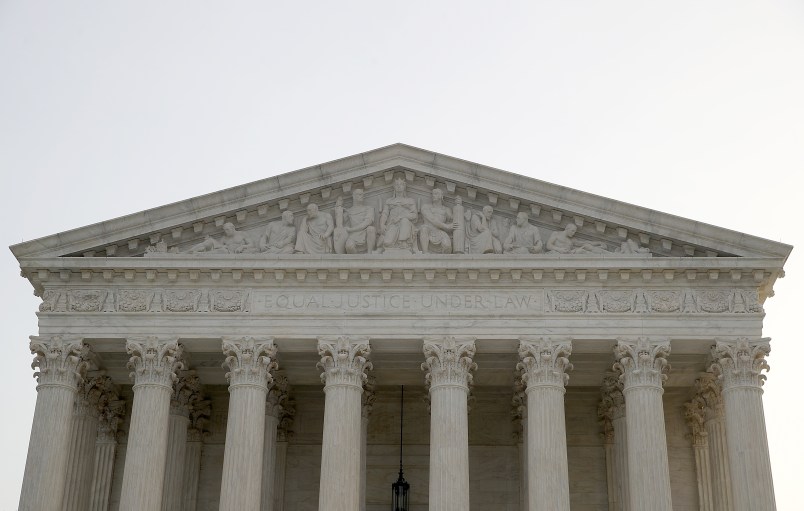HARRISBURG, Pa. (AP) — Boosting the Democrats’ chances of retaking control of Congress in this fall’s midterm elections, the U.S. Supreme Court and a federal panel on Monday rejected Republican challenges to a newly redrawn congressional map imposed on Pennsylvania by the state’s high court.
The federal courts dismissed requests to throw out or halt use of the new district map, which the state court drafted after ruling that the preexisting map violated the state constitution’s guarantee of free and equal elections. That earlier map, drawn by the GOP in 2011, is considered among the most gerrymandered in the nation.
The pair of rulings Monday makes it highly likely that this year’s congressional elections in Pennsylvania will be conducted under district lines widely viewed as more favorable to Democrats than the 2011 map.
Democrats need to pick up 24 seats to take control of the U.S. House of Representatives, 23 if Conor Lamb’s lead holds from last week’s special election in Pennsylvania’s 18th District.
Under the new map, Democrats have a good chance to pick up three seats in the Philadelphia suburbs, and a fighting chance of flipping Republican districts in Harrisburg, Allentown and outside Pittsburgh, said Franklin and Marshall College political scientist Terry Madonna.
“Now, the Democrats nationally will look at Pennsylvania as one of the top priorities, for the obvious reason that of the 24 seats that they need, Pennsylvania has a reasonable chance of putting three in their corner,” Madonna said.
Republicans drew the previous map to aid their candidates. It proved to be a campaign winner, leading the GOP to a 13-5 edge in the state’s congressional delegation for all three elections in which it was used. By contrast, Democrats have a 5-to-4 statewide advantage in voter registration and have won 18 of 24 statewide elections since the 2011 map was enacted.
The pair of court decisions came with just one day left for the state’s congressional candidates to circulate petitions to get on the May 15 primary ballot.
The U.S. Supreme Court turned down the request without comment. Separately, the panel of judges said it had no authority to act in the matter except to dismiss the case.
Democratic Gov. Tom Wolf called the federal judges’ ruling the right decision and said it will let the state move ahead with a fair map.
The Democratic majority on the state Supreme Court had ruled in January that the map Republicans crafted in 2011 amounted to an unconstitutional gerrymander.
After Wolf and lawmakers in the GOP-controlled General Assembly did not produce a replacement, the court enacted its own map last month and gave candidates extra time for petition gathering.
The federal judges’ decision was made in a case brought a month ago by eight sitting Republican congressmen and two GOP state senators. They argued the state justices infringed on the Legislature’s prerogative and did not give lawmakers enough time to come up with a replacement.
The panel said the senators have only two votes in their chamber, calling that “inadequate as a matter of law to allow a lawsuit premised on an institutional injury to the General Assembly.” The eight Republican congressmen, the judges wrote, may have wasted resources campaigning in their old districts, but they cannot prove that was caused by a violation of the U.S. Constitution’s Elections Clause.
“The cost of shifting district boundaries — in terms of both campaign funding and constituent fealty — is surely appreciable,” the judges wrote. “But the federal congressional plaintiffs have identified no legal principle tethering that cost to a legally cognizable interest in the composition of their electoral districts under the Elections Clause.”
Matt Haverstick, a lawyer for the congressmen, said they were disappointed and considering their legal options.
“I think there was confusion last week in PA18’s special” election, Haverstick said. “And I don’t think, with today’s decisions, that that confusion goes away.”
In a separate case , two senior Republicans in the state Legislature who were on the losing end of the state Supreme Court decision had asked the U.S. Supreme Court to issue a stay, which would have resulted in the use of the 2011 map for this year’s congressional elections. They wanted the new map put on hold while they pursued an appeal to the nation’s highest court.
More than 40 candidates had filed petition paperwork by midday Monday, according to state elections bureau data. The deadline to submit at least 1,000 voter signatures to get on the primary ballot is Tuesday.



